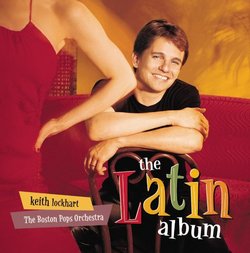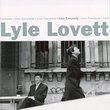| All Artists: Alberto Ginastera, Astor Piazzolla, Agustin Lara, Aaron Copland, Alberto Dominguez, Cesar Villalobos L., Jacob Gade, Camargo Guarnieri, Damaso Perez Prado, Rafael Hernandez, Jose Pablo Moncayo Garcia, Osman Perez Freire, Peruvian Traditional, Oscar Lorenzo Fernandez, Mexican Traditional, Keith Lockhart, Boston Pops Orchestra Title: The Latin Album Members Wishing: 0 Total Copies: 1 Label: RCA Release Date: 9/26/2000 Genres: Dance & Electronic, International Music, Special Interest, Pop, Classical, Latin Music Styles: Latin Music, Flamenco, Tango, Easy Listening, Vocal Pop, Chamber Music, Historical Periods, Modern, 20th, & 21st Century, Symphonies, Latin Pop Number of Discs: 1 SwapaCD Credits: 1 UPCs: 090266371723, 090266371747 |
Search - Alberto Ginastera, Astor Piazzolla, Agustin Lara :: The Latin Album
 | Alberto Ginastera, Astor Piazzolla, Agustin Lara The Latin Album Genres: Dance & Electronic, International Music, Special Interest, Pop, Classical, Latin Music
Even their harshest critics can't accuse Keith Lockhart and the Boston Pops of not trying to have fun. On The Latin Album, they tackle a repertoire that includes big-band favorites and compositions from Piazzolla, Perez Pr... more » ![header=[] body=[This CD is available to be requested as disc only.]](/images/attributes/disc.png?v=a4e11020) ![header=[] body=[This CD is available to be requested with the disc and back insert.]](/images/attributes/disc_back.png?v=a4e11020) ![header=[] body=[This CD is available to be requested with the disc and front insert.]](/images/attributes/disc_front.png?v=a4e11020) ![header=[] body=[This CD is available to be requested with the disc, front and back inserts.]](/images/attributes/disc_front_back.png?v=a4e11020) |
Larger Image |
CD DetailsSynopsis
Amazon.com Even their harshest critics can't accuse Keith Lockhart and the Boston Pops of not trying to have fun. On The Latin Album, they tackle a repertoire that includes big-band favorites and compositions from Piazzolla, Perez Prado, and Aaron Copland (in the form of El Salon México). These are mostly dance tunes, filled with crashing percussion, Latin rhythms, and familiar melodies. To their credit, the Boston Pops get this fiesta right about half the time--opening with Alberto Ginastera's "Malambo," they set a furious, rollicking mood that's heavy on the percussion. They shine on Jacob Gade's "Jalousie" (an early hit for Lockhart predecessor Arthur Fiedler) and on the more atmospheric "Mi Cambio" by César Villalobos. Unfortunately, their arrangement of Piazzolla's "Oblivion" is about as subtle as the music found in soap operas (and about as exciting) and "Perfidia" is a disappointment, "smooth" but hardly sultry. Still, the Pops know how to play their brassy, rhythmic showpieces, and the recorded sound here is excellent. --Jason Verlinde Similarly Requested CDs
|
CD ReviewsDon't Bother! 04/15/2002 (2 out of 5 stars) "I bought this CD at a stoop sale for one dollar, and then sold it at a stoop sale for a dollar or two. I am very glad that I did not pay full price (or even half price) for it. I did not think it was a bad CD, but a bland CD. Every track on it I have heard performed better elsewhere. They are like Muzak versions of great Latin works." OLE! 11/07/2000 (4 out of 5 stars) "Keith Lochart and the Boston Pops Orchestra have hit pure gold with "Latin Album." It's a genuine treat to have so many semi-classical Latin favorites on one album. My only real complaint is the absence of anything from the prodigious pen of Cuba's Ernesto Lecuona; the inclusion of "Malaguena" or "Andalucia" would have more completely rounded out an otherwise exciting recording of music from or inspired by our American neighbors who reside "South of the Border."" A mood-lifter! mairemcg | Euclid, OH United States | 03/29/2001 (4 out of 5 stars) "Keith Lockhart, the Boston Pops, and the guest artists have a hit in this one! I can almost forget the snow outside when I listen to it. I loved "Jalousie!" And Mariachi Cobre stands out on "Granada" and "Son de la Negra." Five star tracks, both of them, with Steve Carrillo's great vocal work on "Granada" and the spirited interchange between the Pops and Mariachi Cobre's brass sections in "Son de la Negra." Purists may object to the combination of Latin music and an orchestra, but I think it's a treat!"
|

 Track Listings (14) - Disc #1
Track Listings (14) - Disc #1








